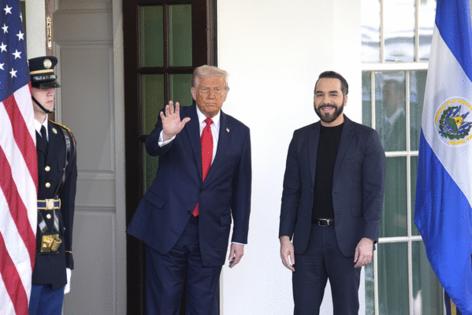Trump credits his oil sanctions, tariffs for Venezuelan regime's financial struggles
Published in News & Features
President Donald Trump is taking credit for Venezuela’s mounting financial crisis, attributing the Nicolás Maduro regime’s economic troubles to aggressive U.S. sanctions imposed by his administration.
Speaking to reporters Monday after a meeting with Salvadoran President Nayib Bukele, Trump accused the Venezuelan government of releasing criminals who are now contributing to regional instability, including in the United States. Despite deteriorating relations between Washington and Caracas, Trump claimed that dialogue with the regime is ongoing and that Venezuelan officials understand the necessary steps to restore diplomatic ties.
“The jails of Venezuela were emptied out, and you know what happened — their crime went way down. But now Venezuela has other kinds of problems,” Trump said. “You know what the problem is? They have no money. Because I shut off their oil and we put secondary tariffs… They know what to do. But they have no money.”
Trump’s remarks come as U.S. policy takes a significantly more forceful approach against Maduro’s regime. A new 25% tariff on oil and gas imports from any country purchasing Venezuelan crude, which took effect April 2, has already triggered a sharp retreat by major international refiners, including Texas giant Chevron, India’s Reliance Industries and a number of Chinese firms.
Analysts warn the tariff could severely damage Venezuela’s already fragile economy, potentially making it the most significant escalation in Washington’s long-running sanctions campaign.
The consequences are already beginning to show. Venezuelan Vice President Delcy Rodríguez announced that U.S. oil giant Chevron has returned crude shipments to the state-run oil company, PDVSA, citing financial restrictions imposed under Trump sanctions.
“Chevron has returned crude oil shipments to PDVSA due to the impossibility and restrictions imposed on it to pay Venezuela,” Rodríguez said via Telegram. She added that the rerouted oil would be redirected to international markets, though she did not disclose specific amount or destinations.
Chevron had served as a stabilizing force in Venezuela’s oil sector, helping lift production above one million barrels per day for the first time since 2019, according to OPEC. Its expected exit on May 27, unless there is a shift in policy, will deal a serious blow to Caracas’s hopes for economic recovery.
In response to mounting pressure, Venezuela’s National Assembly, controlled by Maduro allies, passed an emergency economic decree last week. The measure grants the president broad authority to suspend tax collection, address evasion and enact “exceptional” steps aimed at stabilizing the economy.
Still, experts believe the regime’s options are dwindling.
“Oil revenue is the regime’s lifeblood—without it, everything else collapses,” said Juan Fernández, former vice president of planning at PDVSA. “If they can’t sell oil, they can’t import goods, pay the military or support their inner circle.”
According to Antonio De La Cruz, director of the public policy research group Inter American Trends, the new tariff structure marks a strategic evolution in U.S. policy.
“Previously, sanctions enforcement was primarily a domestic issue for U.S. entities,” he said. “Now, responsibility shifts to foreign governments and companies, raising the risks of engaging with Venezuela to a level that most are unwilling to accept.”
Venezuela’s oil exports, previously buoyed by murky deals with shadowy intermediaries, are increasingly imperiled. Experts warn the country may be forced to offer steeper discounts or abandon key trading partnerships altogether.
Trump, meanwhile, is leveraging the Venezuela issue to reinforce his tough-on-crime and anti-immigration stance.
He has publicly tied the Maduro regime to violent transnational gangs, including the notorious Tren de Aragua, while the U.S. justice system has accused Maduro and Interior Minister Diosdado Cabello of leading the Cartel de los Soles, a drug-trafficking organization that exports around 300 tons of cocaine yearly, mainly to Europe and the United States.
©2025 Miami Herald. Visit at miamiherald.com. Distributed by Tribune Content Agency, LLC.







Comments